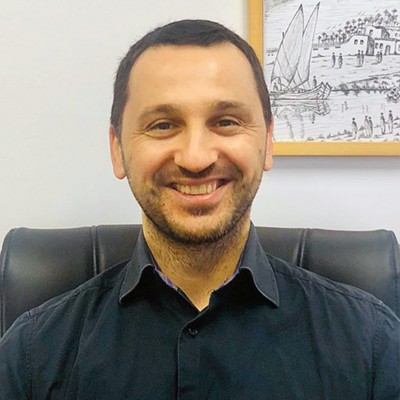
Dr Ylber Marku
New insights on China's Cold War diplomacy
The path to a postgraduate degree is rarely straightforward, as Dr Ylber Marku can no doubt confirm.
Originally from Albania and now a lecturer in the School of History at Zhejiang University in Hangzhou, he completed his PhD in history at Lingnan in 2017, but only after realising that his previous choice, doctoral studies in political science at an Italian university, was just not ideal for him.
However, by good fortune, when attending a seminar on Chinese history in Venice, he encountered two key figures, a well-known Cold War historian and an Italian sinologist, and they provided the encouragement and confidence to branch out in a quite different direction.
“In the field of Cold War history, China’s relations with Albania were overlooked, so there was room for an original contribution,” says Marku who, once convinced, was keen to write a thesis in English and to be based somewhere offering easy access to mainland China. “I was looking for a liberal arts university, one known for fostering close relations between its academic staff and students. That made Lingnan a perfect fit.”
From the outset, he was aware of the likely challenges. Firstly, the primary sources included thousands of files held in different Albanian archives and institutions, so reviewing them would entail travel and patience. Also, with only a beginner’s knowledge of Chinese at the time, he would be limited in the number of mainland sources. And, like the other PhD students in his department, he would have to balance the demands of research work with teaching some history classes for undergraduates.
“Surprisingly, the first skill I found necessary for conducting historical research was the capacity to connect with people and establish good interpersonal relations,” says Marku, who received generous funding for three years through the Hong Kong PhD Fellowship Scheme (HKPFS). “It was important for finding the right people to talk to, explaining the intention and relevance of my research, and for interviewing former diplomats and other experts who, for almost 20 years, had been the main protagonists in events involving China and Albania.”
As study supervisor, Professor Xiaorong Han convened almost weekly meetings. This allowed ample time to discuss archival sources, new ideas, existing obstacles, and recommended reading lists.
“I had great supervision,” Marku says. “Overall, one of the most useful suggestions from Professor Han was to write something every day and not to leave the drafting of the whole PhD thesis for the final year. He also stressed the importance of having a critical approach to academic research.”
Co-supervisor Professor Niccolo Pianciola was similarly perceptive and practical. For instance, he highlighted the all-round benefits of participating in a range of conferences and workshops to gain a broader perspective and connect with other scholars with a view to possible future collaboration.
And, acting as a sounding board, he was always willing to listen to different interpretations of historical events and help test out the validity of new arguments or alternative viewpoints.
“Both professors were great mentors, not only in academic matters, but also in life; we are still in contact and I feel lucky to call them friends,” Marku says. “Looking back, I can see that, at the beginning, my style of writing was not great. But my two supervisors always found the right words to encourage me - without making me feel uncomfortable – and to improve my skills to the level required.”
After successfully completing his thesis within the standard three years, Marku was invited to become a postdoctoral research fellow at Xiamen University’s School of International Relations. Now, at Zhejiang University, he is working on his first monograph and several research articles. And, during the next academic year, he hopes to spend three months as a visiting scholar at the Wilson Centre in Washington and, while there, discuss his proposed book project.
Ideally, that might also open the door to studying other aspects that go beyond the history of China-Albania diplomatic relations, such as economic ties, technology transfer, and cultural influences.
Reflecting on his time at Lingnan, Marku has many fond memories, but admits it initially took some time to adjust to the unfamiliar surroundings and the pace of life in a city which is always on the go.
“Coming from a small country like Albania and having lived in Padua, a small town in North Italy, at first I found that, in a way, Hong Kong’s frenetic rhythm gave me a sense of anxiety,” Marku says. “But later, what most surprised me – positively - was the city’s capacity to attract the best from the West and offer the best from the East, all in an environment full of life and in a state of constant change.”
His general advice for students considering a PhD at Lingnan is to be prepared for a once in a lifetime experience.
“Embrace everything it has to give and try to participate in every kind of activity,” he says. “It is a unique opportunity that only a true liberal arts university can make possible and a great city like Hong Kong can offer.”

